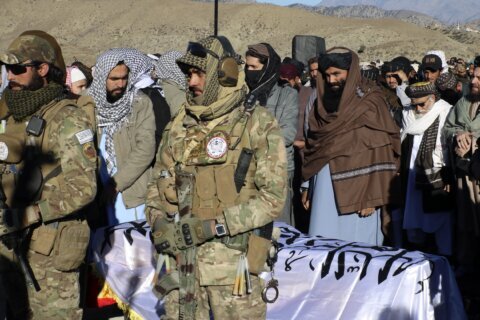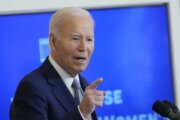HARRISBURG, Pa. (AP) — Democrats are stepping up their outreach to Polish Americans in this year’s presidential election as Kamala Harris and Donald Trump vie for support from a community that could play a decisive role in razor-thin battleground state contests.
Harris hopes to capitalize on Polish Americans’ historic animosity toward Russia and on Trump’s hesitancy to back Ukraine during last week’s debate. The Democratic vice president’s team organized a national call with Polish American supporters on Wednesday to encourage local networks to hold their own events and spread the campaign’s message.
Although Polish Americans are not a particularly large demographic, many of them live in the so-called “blue wall” states that are critical to victory for either candidate. There are an estimated 784,000 in Michigan, 758,000 in Pennsylvania and 481,000 in Wisconsin, three places that Harris is visiting this week.
“We’re talking about an election where a swing of a few thousand voters in any of those states could make all the difference,” said Tom Malinowski, a Polish-born former Democratic congressman from New Jersey.
Filip Jotevski, the newly hired point person for networking with diaspora and ethnic communities, said on Wednesday’s Harris organizing call that if Trump returns to power “he’ll sell out Ukraine” after spending years “cozying up to Vladimir Putin.”
Trump was originally scheduled to stop by a Polish American shrine in Pennsylvania on Sunday for the unveiling of a monument to the anticommunist Solidarity movement. However, the visit was cancelled, according to a person familiar with the Republican candidates’ plans who spoke on the condition of anonymity. Trump had been expected to be there at the same time as Polish President Andrzej Duda.
The Polish American community was pushed into the spotlight during the Sept. 10 debate in Philadelphia, when Trump twice refused to say whether he wanted Ukraine to win the war against Russia.
“Negotiate a deal,” Trump said. “Because we have to stop all of these human lives from being destroyed.”
Harris fired back that if Trump had been president when the invasion took place, “Putin would be sitting in Kyiv with his eyes on the rest of Europe.”
“Why don’t you tell the 800,000 Polish Americans right here in Pennsylvania how quickly you would give up,” she said.
Some were surprised yet pleased to hear their community mentioned on the debate stage.
“She knew what she was talking about,” said Tony Pol, a 67-year-old retired fire chief in Erie, Pennsylvania, who spent a quarter century helping run a Polish American fraternal organization. “I think that’s the concern of everybody — if Ukraine goes down, then Poland goes next, and that’s very concerning.”
Gosia Dodi, originally from Poland and now an American citizen living in western Michigan, said she “absolutely agrees” with Harris that Russia could target Poland if Ukraine loses. The 61-year-old described Trump’s affection for Putin as “dangerous for Poland.”
“I want the war over, but not the way he’s saying,” she said. “He thinks he can fix everything within one day or something, which is ridiculous.”
After Poland was devastated in World War II, the country spent decades as a satellite state of the Soviet Union. A revolution ended communist rule in 1989, paving the way for the country’s modern multiparty democracy.
Poland became a NATO member in 1999. Timothy L. Kuzma, a Pittsburgh resident who leads the Polish Falcons of America, a fraternal organization with 19th-century roots in Chicago’s large Polish immigrant community, said his community’s voters want to see a candidate that’s committed to strong transatlantic bonds.
“If either candidate doesn’t give those kinds of assurances, that’s problematic,” he said. “The candidates, both parties, have to pledge their support to Poland, to Ukraine, to NATO and to the overall security of Eastern Europe — and that’s all of Eastern Europe — and Europe as well.”
Trump has previously suggested withdrawing the United States from NATO, which would devastate the alliance, and he’s demanded that allies increase their defense spending to reduce the burden on Washington. If they didn’t, Trump warned, the U.S. would not uphold its treaty obligations and “would encourage them” — meaning Russia — “to do whatever the hell they want.”
Pete Alibali, 53, immigrated from Soviet-controlled Poland when he was 16, because his mother, a chemist, wanted to advance her career without becoming a communist party member.
A lifelong Democrat who now lives in Madison, Wisconsin, Alibali views Putin as a “predator and a continuation of the Soviets.” Beyond his concern for his native Poland, he worries that tiny Baltic nations could also be threatened if Ukraine is defeated.
Alibali acknowledged that many Polish Americans are conservative, growing up reading Polish newspapers, working in Polish-owned businesses, listening to Polish radio and attending their neighborhood Catholic church. He described his uncle, who lives in Chicago, as a “very rabid Trump supporter.”
“Trump divided my family,” Alibali said.
Polish American voters have swung back and forth between Democrats and Republicans in presidential elections over the years. They supported Trump in 2016 but backed President Joe Biden in 2020.
Malinowski said Trump’s visit to the shrine “shows that he’s nervous that he might be losing ground among a group of voters that he may have taken for granted.” He also downplayed any suggestion of friendship between Trump and Duda, a right-wing politician who once suggested renaming a military base in his country as Fort Trump.
“I know the Poles are nervous,” he said. “The advice they’re getting is, cultivate Trump just in case. They’re doing it with fingers crossed.”
Tom Kolano, a 55-year-old Republican in suburban Pittsburgh whose ancestors were Polish immigrants, said he’s encouraged by Trump’s relationship with Duda.
“I’m not worried that President Trump will abandon Ukraine,” Kolano said. “Here’s one big reason — I think Poland will have a lot to say about that.”
He pointed out that Duda and his political rival, Polish Prime Minister Donald Tusk, used a visit to Washington in March to press a divided Congress to break its impasse over replenishing funds for Ukraine at a critical moment in the war.
John Laka, 66, of Appleton, Wisconsin, believes that Trump will be stronger overall on foreign policy than Harris.
“I just don’t have a lot of confidence in her as a leader or president,” he said. “She’s just really lacking.”
Laka’s parents immigrated to the United States from Poland, and he’s not sure how much the country is really imperiled by Russia.
“The threat of Putin going further is always going to be there unless there’s that idea of deterrence and right now we’re not deterring going anywhere,” he said.
___
Megerian reported from Washington. Associated Press writer Joey Cappelletti in Lansing, Michigan, Scott Bauer from Madison, Wisconsin, and Jill Colvin from New York contributed to this report.
Copyright © 2024 The Associated Press. All rights reserved. This material may not be published, broadcast, written or redistributed.






